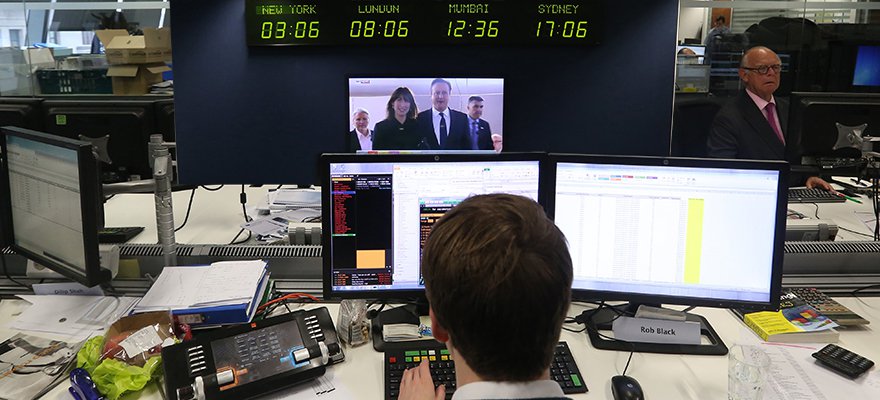This article was written by Dr. Jock Percy, CEO of Perseus.
For such a nascent technology, it is remarkable how quickly Blockchain has become one of the hottest topics in the financial service industry. This looks set to continue into 2016 as firms race to test and, potentially, become early adopters of a technology that can drive a very powerful database or decentralised ledger.
The technology was originally developed to power the cryptocurrency Bitcoin , with each transaction logged in an encrypted block creating a permanent, secure digital record of every process. But the countless possible applications of such a product have led banks, exchanges, funds and even governments to invest in the development and testing of the technology for their own uses. The blockchain can also be used to record and validate any exchange of assets, such as bonds, currencies or commodities.
What makes this exciting are the tangible benefits to be had from speeding up transaction settlement time that currently takes days, increasing transparency and at the same time freeing up precious capital. Yet how realistic are these promised gains and how much of the buzz around blockchain is justified?
Leaps and bounds
At the end of last year, Nasdaq came to the fore as one of the first major institutions to successfully use the technology to complete a transaction: in this case a share sale. The blockchain had created a full digital record of the whole process, which Nasdaq says significantly reduced the settlement time and eliminated the need for paper stock certificates. The exchange group developed its new Linq system based on this technology, in partnership with the blockchain specialist fintech firm Chain. Nasdaq began establishing a track record of digital currency and blockchain investments including their partnership with Noble Markets, a start-up blockchain based exchange that included Bitcoin.
At the start of May, Chain also released a blockchain protocol for financial networks, developed in conjunction with Nasdaq, Citi, Visa and other financial heavyweights, which is another significant step forward in reassuring the market of the viability and security of blockchain technology. In February, the Financial Times reported that five major UK asset managers are also testing the technology for trading illiquid securities between themselves, a process which can currently take days. Blockchain in this environment can potentially reduce overhead, the use of intermediaries and staffing costs.
Disruptive potential
But why the big rush to be an early adopter of this technology? As Nasdaq’s chief executive Bob Greifeld highlighted, this process has the potential to revolutionize the core of capital markets infrastructure systems and finally present a solution to many outdated administrative functions.
Indeed, blockchain is often hailed as being the future of the industry due to its potential to improve processes as diverse as clearing, settlement, corporate actions and more. And as the coding behind blockchain is open source, systems can be cheaply developed and adapted for purpose.
It could also tackle the issue of counterparty risk in the real-time trade settlement model, T+0, by instead automating the checking and transfer of funds in a transaction. In trading, the technology can dramatically shorten settlement times which may ultimately free up capital currently held in silos. It may even prove to be a way of providing and checking collateral in real-time, removing the need for large amounts of buffer funds which are currently tied up with clearing houses around the world. Clearing and settlement could feasibly employ blockchain technology to further improve and automate their processes.
Proceed with caution
However, we also recognize that while early adoption of such innovative technology is an important step for the industry, firms should of course proceed with due diligence and an awareness of the risks. Having been developed as part of the rise of Bitcoin attaches a certain stigma to the technology for some, due to the cited examples of illicit trade funded by Bitcoin. Some clients and companies may be wary of such a link, particularly in light of know-your-customer and anti-money-laundering (KYC and AML) regulatory demands.
As with any new processes, blockchain-based applications will require vigorous testing to avoid reputational damage caused by system failures. In fact, we are confident that this is already the case as evidenced in the careful roll-out of Noble Markets exchange and consortiums such as R3, formed by a group of 43 market-leading banks, demonstrating an awareness of this need in all their current trials.
Forward thinking
However, you cannot put the rabbit back in the hat. I know I use that often, but you cannot ‘uninvent’ technology, and there is much to be gained from embracing and developing the most innovative features of these processes. This is exactly what the market is doing with blockchain.
Our view is that blockchain is part of the wider trend of firms recognizing the benefits of freeing themselves from dated do-it-yourself (DIY), proprietary technology and instead outsourcing for innovative solutions. The benefits of adopting application level solutions specially suited for an individual firm’s work flow on the blockchain are profound. With blockchain, the elimination of outdated processes such as paper contracts and emailed spreadsheets will categorically reduce human error and operational risk.
It is early days and widespread adoption of the technology realizing its promise of greater transparency, automation and cost savings may not be seen for several years, but I’ve said this before and will say it again - this will revolutionise how we conduct trade and finance in our lifetime.






















